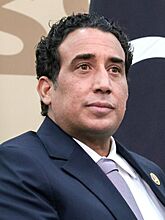List of heads of state of Libya facts for kids
Quick facts for kids Chairman of the Presidential Council of Libya |
|
|---|---|

Seal of the Presidential Council of Libya
|
|
| Government of National Unity | |
| Style | Mr. Chairman His Excellency |
| Member of | Presidential Council |
| Seat | Tripoli, Libya |
| Deputy | Vice Chairman of the Presidential Council |
This article shares information about the leaders of Libya since it became an independent country in 1951.
Libya has faced many challenges since 2011. This period is known as the Libyan crisis. It led to the end of the Libyan Arab Jamahiriya government. The country also experienced a civil war and help from other countries.
After the first civil war, there was more fighting between different groups. This led to a second civil war in 2014. Today, control over Libya is divided. The Government of National Stability (GNS) is in Tobruk. It is supported by the House of Representatives (HoR). The Government of National Unity (GNU) is in Tripoli. Other groups also control parts of the country.
Contents
Leaders of Libya (1951–present)
Kingdom of Libya (1951–1969) |
||||||||
|---|---|---|---|---|---|---|---|---|
| No. | Name | Portrait | Lifespan | Time in Power | Family | |||
| Start Date | End Date | How Long | ||||||
| 1 | Idris I |  |
1889–1983 | 24 December 1951 | 1 September 1969 | 17 years, 251 days | Senussi | |
| He was the first and only King of Libya. He was removed from power in a revolution in 1969. | ||||||||
Libya under Gaddafi (1969–2011)Libyan Arab Republic (1969–1977) |
||||||||
| No. | Name | Portrait | Lifespan | Time in Office | Political Group | |||
| Took Office | Left Office | Time in Office | ||||||
| 2 | Muammar Gaddafi | 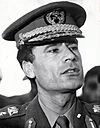 |
1942–2011 | 1 September 1969 | 2 March 1977 | 7 years, 182 days | Military / Arab Socialist Union |
|
| He was the Chairman of the Libyan Revolutionary Command Council (RCC). Gaddafi ended the RCC in 1977. This happened after the General People's Congress (GPC) decided to give power to the people. | ||||||||
Libyan Arab Jamahiriya (1977–2011) |
||||||||
| (2) | Muammar Gaddafi |  |
1942–2011 | 2 March 1977 | 2 March 1979 | 2 years | Military / Independent (Islamic socialist) |
|
| He was the Secretary-General of the GPC. Gaddafi gave up his government jobs in 1979. But he remained the "Brotherly Leader and Guide of the Revolution". He kept control over Libya until he was removed from power and died during the First Civil War in 2011. | ||||||||
| 3 | Abdul Ati al-Obeidi | 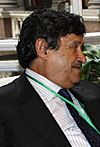 |
1939–2023 | 2 March 1979 | 7 January 1981 | 1 year, 311 days | Independent (Islamic socialist) |
|
| He was the Secretary-General of the GPC. He was also the Prime Minister from 1977 to 1979. | ||||||||
| 4 | Muhammad az-Zaruq Rajab |  |
born 1940 | 7 January 1981 | 15 February 1984 | 3 years, 39 days | Independent (Islamic socialist) |
|
| He was the Secretary-General of the GPC. He later served as Prime Minister from 1984 to 1986. | ||||||||
| 5 | Mifta al-Usta Umar |  |
1935–2010 | 15 February 1984 | 7 October 1990 | 6 years, 234 days | Independent (Islamic socialist) |
|
| He was the Secretary-General of the GPC. He was in office during the 1986 United States bombing of Libya. | ||||||||
| 6 | Abdul Razzaq as-Sawsa |  |
1933–2016 | 7 October 1990 | 18 January 1992 | 1 year, 103 days | Independent (Islamic socialist) |
|
| He was the Secretary-General of the GPC. | ||||||||
| 7 | Muhammad az-Zanati | 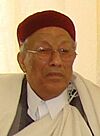 |
1937–2025 | 18 January 1992 | 3 March 2008 | 16 years, 45 days | Independent (Islamic socialist) |
|
| He was the Secretary-General of the GPC. | ||||||||
| 8 | Miftah Muhammed K'eba |  |
born 1947 | 3 March 2008 | 5 March 2009 | 1 year, 2 days | Independent (Islamic socialist) |
|
| He was the Secretary-General of the GPC. | ||||||||
| 9 | Imbarek Shamekh |  |
born 1952 | 5 March 2009 | 26 January 2010 | 327 days | Independent (Islamic socialist) |
|
| He was the Secretary-General of the GPC. He also served as Prime Minister from 2000 to 2003. | ||||||||
| 10 | Mohamed Abu al-Qasim al-Zwai |  |
born 1952 | 26 January 2010 | 23 August 2011 | 1 year, 209 days | Independent (Islamic socialist) |
|
| He was the Secretary-General of the GPC. He was in office during the First Civil War. He was removed from power during the Battle of Tripoli. | ||||||||
Transition Period (2011–present) |
||||||||
| 11 | Mustafa Abdul Jalil | 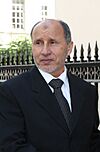 |
born 1952 | 5 March 2011 | 8 August 2012 | 1 year, 156 days | Independent | |
| He was the Chairman of the National Transitional Council (NTC). This group was in rebellion until August 2011. It was based in Benghazi during that time. | ||||||||
| — | Mohammed Ali Salim |  |
1935–2022 | 8 August 2012 | 9 August 2012 | 1 day | Independent | |
| He was the acting President of the General National Congress (GNC). He held this role briefly to oversee the transfer of power from the NTC. | ||||||||
| 12 | Mohammed Magariaf | 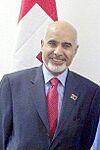 |
born 1940 | 9 August 2012 | 28 May 2013 | 292 days | National Front Party | |
| He was the President of the GNC. He resigned to follow a new law passed in May 2013. | ||||||||
| — | Giuma Ahmed Atigha | 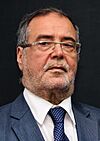 |
born 1950 | 28 May 2013 | 25 June 2013 | 28 days | Independent | |
| He was the acting President of the GNC. | ||||||||
| 13 | Nouri Abusahmain | 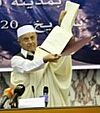 |
born 1956 | 25 June 2013 | 5 April 2016 | 2 years, 285 days | Independent | |
| He was the President of the GNC. His government was based in Tripoli. It was recognized by other countries until August 2014. | ||||||||
| After the 2014 election, the government split. The new House of Representatives (HoR) and the old GNC both claimed power. This led to the Second Civil War. The 2014 elections were later declared invalid by the Supreme Court. | ||||||||
| — | Abu Bakr Baira | 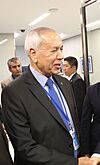 |
born 1941 | 4 August 2014 | 5 August 2014 | 1 day | Independent | |
| He was the acting President of the House of Representatives (HoR). He held this role briefly for the transfer of power from the GNC. | ||||||||
| 14 | Aguila Saleh Issa | 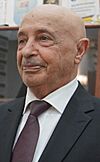 |
born 1944 | 5 August 2014 | 15 March 2021 | 6 years, 222 days | Independent | |
| He was the President of the HoR. His government was based in Tobruk. It was recognized by other countries until March 2016. | ||||||||
| After the Presidential Council and the Government of National Accord (GNA) started, the government was still split. The HoR and the National Salvation Government (NSG) both claimed power. However, the High Council of State (HCS) in Tripoli recognized the GNA. | ||||||||
| 15 | Fayez al-Sarraj | 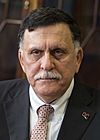 |
born 1960 | 30 March 2016 | 15 March 2021 | 4 years, 350 days | Independent | |
| He was the Chairman of the Presidential Council. He was also the Prime Minister of the Government of National Accord (GNA). His government was recognized by other countries and based in Tripoli. | ||||||||
| 16 | Mohamed al-Menfi | 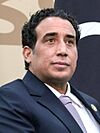 |
born 1976 | 15 March 2021 | Incumbent | 4 years, 348 days | Independent | |
| He is the current Chairman of the Presidential Council. His government is recognized by other countries and based in Tripoli. | ||||||||
Timeline
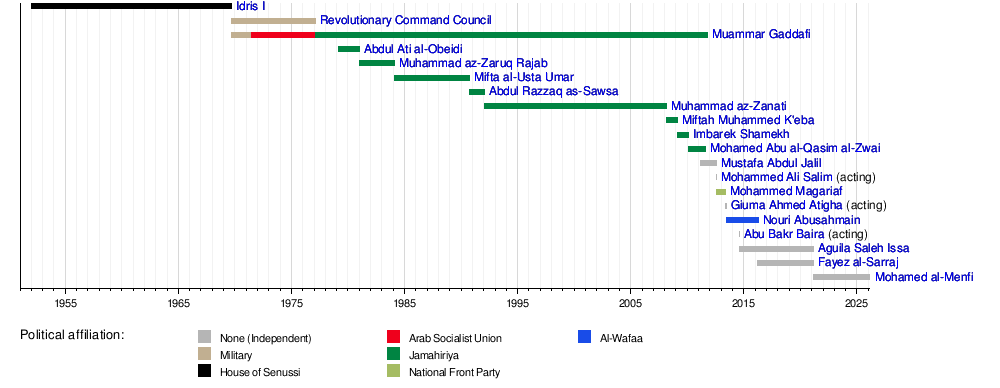
See also
- List of governors-general of Italian Libya
- List of heads of government of Libya
- Brotherly Leader and Guide of the Revolution
Black History Month on Kiddle
African-American Women you should know
 | Anna J. Cooper |
 | Mary McLeod Bethune |
 | Lillie Mae Bradford |

All content from Kiddle encyclopedia articles (including the article images and facts) can be freely used under Attribution-ShareAlike license, unless stated otherwise. Cite this article:
List of heads of state of Libya Facts for Kids. Kiddle Encyclopedia.

